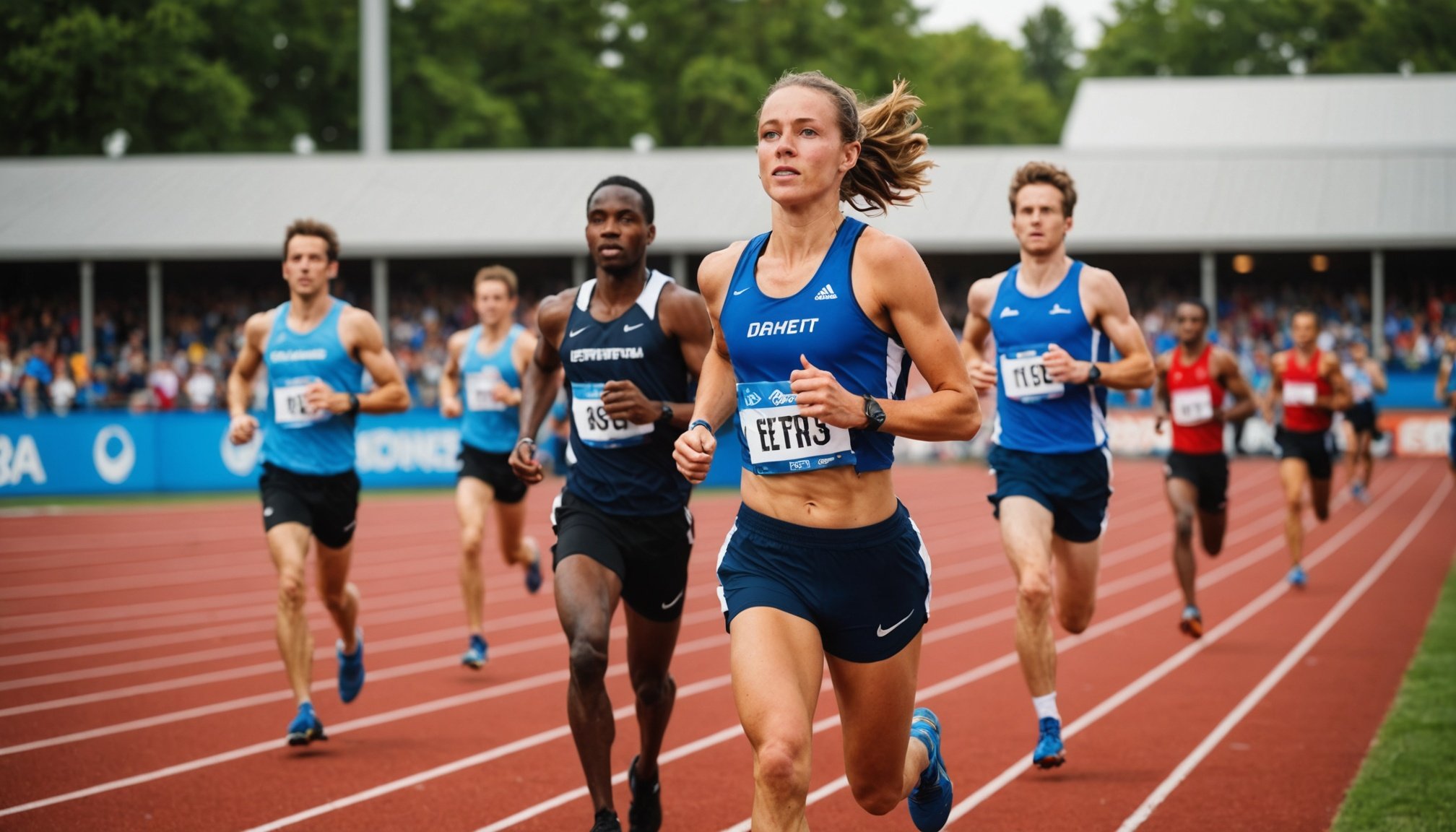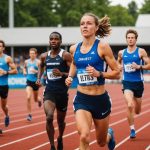Importance of Hydration During Outdoor Track Events
Proper hydration is crucial for optimal athletic performance, especially during outdoor track events. It plays a significant role in maintaining endurance and facilitating recovery. Dehydration risks rise significantly during these intensive activities, impacting both physical and cognitive function.
The consequences of dehydration can be severe, causing an athlete’s performance to plummet. Lack of proper hydration leads to a decrease in energy, impaired muscular function, and a slower reaction time. Moreover, athletes may experience dizziness and a loss of coordination, which can be dangerous during competitive events.
In the same genre : Essential strength training exercises every elite rock climber must perfect
On the other hand, understanding the benefits of hydration can make a significant difference. Supplying the body with adequate fluids ensures sustained endurance by maintaining the body’s electrolytes balance. This, in turn, helps regulate body temperature and transport energy efficiently to the muscles.
Moreover, proper hydration assists in faster recovery post-event, minimizing muscle soreness and speeding up physiological processes. For athletes, consistently meeting daily water needs is essential, not only for performance on the track but also for overall health. Remember, maintaining hydration is a simple yet effective strategy to maximize athletic potential and protect against the adverse effects of dehydration.
In the same genre : Unlocking the secrets to post-pentathlon recovery: essential strategies for effective cool down
Recommended Fluid Intake Guidelines
Adequate fluid intake is essential to sustain performance during track events. The amount needed varies based on factors like age and activity level. Generally, adults should aim for 3-4 litres daily, increasing proportionally with activity. Prior to events, athletes should focus on pre-event hydration strategies. Start with consistent daily hydration and, on event day, consume about 500ml of water 2 hours before engaging.
During events, maintaining hydration is vital. Sip small amounts regularly to prevent dehydration from hindering performance. Post-event, rehydration is equally important; it helps replenish fluids lost through sweat, restoring electrolytes crucial for recovery.
When considering hydration guidelines, remember they should be tailored to individual needs. Heavier sweating necessitates increased fluid intake, and understanding personal requirements improves hydration efficiency.
Customizing hydration strategies enhances endurance and overall performance. Each athlete’s daily water needs may differ; however, following these guidelines ensures effective hydration. Employing these methods not only optimizes physical performance but also safeguards health against dehydration risks. Athletes should be mindful of their hydration routine, adjusting as required to align with their body’s specific hydration needs during high-intensity outdoor activities.
Types of Hydration Drinks
Choosing the right hydration drinks is vital for athletes participating in outdoor track events. Different types of drinks serve distinct purposes based on the athlete’s hydration needs and the intensity of the activity. Understanding the differences between water, sports drinks, and electrolyte solutions can help make informed choices.
Water
Water is the most basic hydration option and is typically sufficient for low to moderate workouts. It efficiently quenches thirst without additional sugars or calories. However, during extended or intense events, water alone might not replace essential minerals lost through sweat.
Electrolyte Solutions
These drinks, enriched with minerals like sodium and potassium, help maintain the body’s electrolyte balance. Ideal for long-duration events and hot climates, they prevent dehydration risks by ensuring sustained energy and endurance. Electrolyte loss can lead to muscle cramps or fatigue, so replenishing them is crucial.
Sports Drinks
Sports drinks provide carbohydrates and electrolytes, supporting energy needs and hydration simultaneously. They are beneficial during prolonged or high-intensity events where quick energy recovery is necessary. However, it’s important to be mindful of their sugar content which can be excessive if consumed excessively. Choosing between water and sports drinks depends on the workout length and intensity, tailoring consumption to align with individual demands.
Timing of Hydration
Understanding the timing of hydration is essential for maximizing performance during track events. A well-structured hydration plan ensures optimal energy levels and recovery.
Pre-event hydration focuses on preparing the body for the upcoming exertion. It’s recommended to begin hydrating at least 24 hours before the event, gradually increasing water intake. Consuming 500ml of water about two hours prior to the start is beneficial. This strategy supports electrolyte balance and cellular function, giving athletes a head start on maintaining hydration levels.
During the event, consistent hydration timing becomes even more crucial. Athletes should aim to take small, regular sips of fluids to prevent significant dehydration risks. This approach helps maintain physical performance and cognitive focus. It’s essential to strike a balance between drinking enough to stay hydrated and avoiding excessive fluid intake that can lead to discomfort.
Post-event rehydration is equally vital. The goal is to replenish the fluids and electrolytes lost through sweat. Consuming an adequate amount of fluids, perhaps with electrolyte-enhanced drinks, aids in swift recovery, reduces muscle soreness, and supports overall health. Adapting hydration habits based on personal needs and event conditions ensures sustained endurance and effective recovery.
Symptoms of Dehydration
In track events, recognizing dehydration symptoms early can prevent severe performance declines. Physically, athletes may experience a dry mouth, increased thirst, or dark urine. More critical symptoms include dizziness, rapid heartbeat, and muscle cramps. These signs of dehydration can negatively impact endurance and coordination, crucial factors in competitive settings.
Dehydration also affects athletes mentally. Symptoms might include confusion, reduced concentration, and difficulty making decisions—vital skills for strategizing and maintaining pace during a race. Understanding the mental consequences of dehydration is essential for both athletes and coaches.
To promote athlete hydration awareness, several strategies can be employed. Monitoring urine colour and thirst levels regularly informs athletes of their hydration status, enabling timely fluid intake adjustments. Coaches should encourage athletes to listen to their bodies and educate them on hydration’s role in peak performance.
Additionally, implementing structured education sessions about hydration helps athletes identify personal hydration needs. This knowledge empowers them to self-regulate fluid intake more effectively across various environments and activity levels. Understanding both physical and mental dehydration symptoms can safeguard against performance pitfalls, helping athletes maintain their competitive edge in outdoor track events.
Additional Strategies for Staying Hydrated in Outdoor Conditions
Ensuring effective hydration strategies during outdoor track events can significantly impact an athlete’s performance. Adapting to different climates requires tailored approaches to maintain hydration levels.
Hydration Stations
Providing accessible hydration stations at frequent intervals during events encourages consistent fluid intake. Athletes can easily replenish lost fluids, minimising dehydration risks. Strategically placing these stations ensures athletes have regular access, catering to individual hydration needs without interrupting their performance rhythm.
Cooling Techniques
Incorporating effective cooling techniques can amplify hydration efforts. Cold towels, misting fans, and shaded rest areas help regulate body temperature, reducing the risk of heat-related dehydration. These measures not only aid physical comfort but also help prevent overheating, a common issue in hot climates that can exacerbate dehydration.
Choosing the Right Gear
Selecting appropriate gear is crucial for outdoor hydration management. Lightweight, breathable clothing enhances heat dissipation, while hydration packs and handheld bottles offer convenient access to fluids. Opting for gear designed to fit personal preferences and the event environment ensures sustained hydration. These strategies, combined with understanding personal water needs, can help athletes maintain optimal performance and well-being in various weather conditions.
Expert Recommendations and Quotes
Insights from Sports Nutritionists
Sports nutritionists emphasise the hydration importance not just for performance but overall health. Experts suggest adhering to daily water needs, highlighting that starting the day well-hydrated can significantly impact athletic performance. They advocate for personalising intake based on individual hydration needs, environment, and exertion level for maximum benefit.
Athlete Testimonials
Professional athletes like Mo Farah emphasize the crucial role of hydration in maintaining peak performance. He shares, “I’ve experienced the impact of dehydration risks firsthand. Keeping properly hydrated helped me stay focused and improve my recovery times.” Feedback from elite athletes consistently supports tailored hydration strategies to prevent energy depletion and enhance endurance.
Summary of Recent Research
Recent studies reinforce the benefits of hydration, pointing to improved cognitive function, reduced injury rates, and better recovery outcomes. Research underscores the necessity of consistent fluid intake before, during, and after events to mitigate dehydration risks. By integrating research-backed strategies, athletes can optimise performance and long-term well-being.
FAQs about Hydration for Athletes at Track Events
Understanding hydration FAQs is critical for athletes to optimize performance and recovery. Addressing frequent athlete hydration questions helps dispel common myths and enhance hydration practices.
Myth-Busting Common Misconceptions
One common myth is that thirst is an adequate indicator of dehydration risk. In reality, thirst often develops after dehydration has begun, signalling a need for proactive fluid intake to preempt dehydration risks. Consistent fluid consumption, rather than relying solely on thirst cues, is essential.
Personalized Hydration Plans
Creating personalized hydration plans involves assessing individual hydration needs based on sweat rate, climate conditions, and exertion level. Daily water needs differ; hence, tailoring activity-specific plans optimizes hydration efficiency. Consulting sports nutritionists can provide precise recommendations.
Technology in Hydration Tracking
Technology now aids in tracking hydration, offering solutions like wearable devices that monitor fluid levels and remind athletes to hydrate. Apps can analyse data to suggest optimal hydration timing, catering to personalized daily requirements. This innovative approach boosts hydrate adherence and enhances hydration guidelines application, making it easier for athletes to maintain their regimen.
Incorporating these technologies and strategies ensures athletes remain well-hydrated, guarding against performance drops and maximizing endurance during track events.











